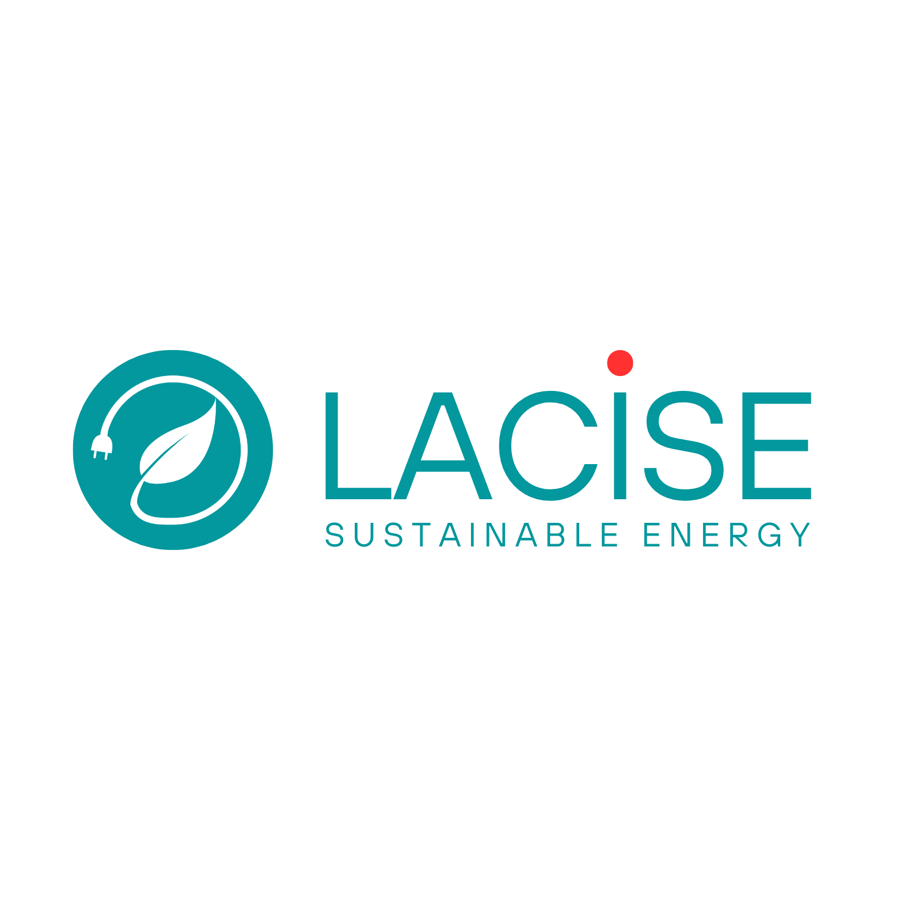International Battery Day: A Look into Battery History and Their Role in Future Innovations
On 18 February, the world celebrates International Battery Day, honouring the Italian physicist Alessandro Volta (born on 18 February 1745), who in 1801 invented the first true battery. His invention marked the beginning of the era of electrochemistry and the practical use of electrical energy — a field that continues to evolve today and remains a key research direction within the LACISE project.
A Glimpse into Battery History
The battery created by Volta — the Voltaic pile — was surprisingly simple: alternating discs of silver (or copper) and zinc, separated by pieces of leather or cardboard soaked in saltwater. Despite its simple design, it became the first device capable of providing a continuous electrical current, laying the foundation for electrical engineering, the discovery of electrolysis, and, later, the age of the telegraph and other electrical devices.
 Photo of Voltaic pile by Luigi Chiesa - Own work, CC BY 3.0, https://commons.wikimedia.org/w/index.php?curid=5042106
Photo of Voltaic pile by Luigi Chiesa - Own work, CC BY 3.0, https://commons.wikimedia.org/w/index.php?curid=5042106
Interestingly, the principle of the battery may have existed 2,000 years before Volta. In 1938, a clay vessel from the Parthian Empire was discovered near Baghdad. The jar contained a copper cylinder, an iron rod, and an acidic vinegar solution — a construction capable of producing 1.1–2 volts of electricity. While scientists still debate whether this object was truly used as a battery, it highlights how long humanity has been intrigued by electrochemical processes.
The term “battery” was introduced by Benjamin Franklin in 1748, well before Volta’s invention. While experimenting with the charging of Leyden jars, he used the term “electrical battery” to describe several devices connected in series, possibly inspired by the military term referring to a group of artillery units.
From Experiments to the European Green Deal
Today, batteries are integral to modern life — from mobile phones and portable electronics to electric vehicles and renewable energy storage solutions. They play a crucial role in the European Union’s path toward climate neutrality, enabling the transition to electric vehicles, supporting efficient storage of wind and solar energy, and significantly reducing CO₂ emissions in the transport and industrial sectors. The battery field is dynamic and constantly evolving — new materials are being developed, safety is improving, energy density is increasing, and more sustainable production solutions are being sought.
LACISE’s Contribution to the Future of Batteries
Within the LACISE project, battery technology research is one of the three core scientific areas. Our team is working on next‑generation battery materials and solutions that will help increase energy density, enhance safety, extend battery lifespan, and reduce the use of environmentally harmful resources.
These research outcomes are essential for Europe to maintain competitiveness and ensure a sustainable, safe, and efficient battery ecosystem.
Join Us at the First Battery Industry Day – 25 February
LACISE, in collaboration with the Institute of Solid State Physics, University of Latvia (ISSP UL), invites you to the first Battery Industry Day on 25 February.
The event will bring together scientists, industry representatives, and policymakers to share the latest technological discoveries, build bridges of cooperation between research and industry, and discuss strategic priorities for the European battery market.
This day will be an excellent opportunity to explore ongoing battery research at the ISSP UL and jointly discuss future challenges and opportunities.
EDI engineer Aleksejs Oņackis successfully defends master’s thesis developed within LACISE project
 Aleksejs Oņackis. Photo - personal archive.
Aleksejs Oņackis. Photo - personal archive.
The LACISE team is pleased to congratulate Aleksejs Oņackis, an electrical systems engineer at the Institute of Electronics and Computer Science (IECS) — one of the LACISE consortium partners — on the successful defence of his master’s thesis and engineering project. The work was completed within the professional master’s study programme Smart Electrical Power Engineering at Riga Technical University.
Aleksejs’ research focused on the stability of the Baltic power system, including isolated operation frequency tests and dynamic modelling. The thesis was developed using real measurement data and specialised tools for power system modelling, yielding practical insights for the energy sector.
Both works were carried out within the LACISE project, part of the Swiss–Latvian Cooperation Programme Partnership in Applied Research.
 Picture: A. Oņackis defending his Master's Thesis at RTU. Source – personal archive.
Picture: A. Oņackis defending his Master's Thesis at RTU. Source – personal archive.
We are proud of Aleksejs’ accomplishment and wish him every success as he continues his professional and research journey.
Short-Term Cloud Motion Forecasting Model
One of the tasks during the first year of the LACISE project is to explore algorithms and deep neural network architectures in order to develop and validate the foundations of a cloud motion forecasting model for very short prediction horizons. This is carried out by scientists from the Institute of Electronics and Computer Science (EDI, Latvia) together with partners from the Swiss Center for Electronics and Microtechnology (CSEM, Switzerland).
Cloud movement is among the most challenging atmospheric processes to predict, and its rapid variability significantly affects both weather conditions and technological systems that depend on solar radiation. Therefore, accurate forecasting of cloud displacement over very short time intervals, ranging from a few minutes to half an hour, is becoming increasingly important.
Short-term cloud forecasts are particularly critical in solar energy production, where cloud shadows can cause rapid power fluctuations. Timely prediction of cloud appearance or disappearance enables operators to stabilize the electricity grid, plan generation, and reduce the need for reserve capacity.
The developed cloud motion forecasting model (see figure) is capable of analyzing sequential sky observation camera images and calculating how cloud structures will evolve over the upcoming minutes. The figure illustrates five input frames and the model’s 90-second forecast, compared with the actual sky observed at the same moment. This solution significantly reduces uncertainty in solar energy planning, allowing for the timely anticipation of cloudy periods and their impact on electricity generated by solar panels.
 Figure: cloud motion forecast for a 90-second horizon: model prediction versus
observed reality
Figure: cloud motion forecast for a 90-second horizon: model prediction versus
observed reality
In 2026, the forecasting model is planned to be expanded by incorporating parametric data from a solar irradiance sensor, wind speed sensor, temperature sensor, and solar panel performance indicators. This approach will enable the model to synchronously link cloud movement with real changes in solar irradiance generation, thereby substantially improving forecast accuracy for solar energy planning.
Hydrogen, curiosity, and the future of mobility: Meet Germans Vlasenko, a school student developing his SRP at the LACISE project
 German Vlasenko at the RTU's Institute of Physics and Materials Science
German Vlasenko at the RTU's Institute of Physics and Materials Science
The LACISE project continues to offer young people practical opportunities to engage with real scientific research. This time, we speak with another student carrying out his scientific research paper (SRP) within the project, at the Institute of Physics and Materials Science of Riga Technical University (RTU).
Germans Vlasenko, a 12th-grade student at Riga State Gymnasium No. 2, is one of those young people eager to dive into science not only theoretically but also hands-on. His SRP focuses on decoupled electrolysis using binder-free supercapacitor-type electrodes in an acidic environment – a topic closely linked to the development of modern energy systems and sustainable transport.
Germans’ interest in the topic developed naturally - from his passion for cars and his curiosity about what sustainable transport might look like in the future. “In my SRP, I wanted to explore something related to cars, and hydrogen seemed particularly exciting to me,” he explains. Hydrogen as a potential future fuel—and the possibility of preserving internal combustion engines while reducing their environmental impact—became the foundation of his research.
When Germans contacted Prof. Andris Šutka to explore the possibility of conducting hydrogen-focused research at RTU, his research quickly took shape. “After meeting with Mg. sc. ing. Mairis Iesalnieks, we agreed to work on the topic of decoupled electrolysis,” he recalls.
The path to science begins with a simple question: how does it work?
Germans describes himself as someone deeply interested in physics and chemistry. He studies both subjects in depth and believes they complement each other perfectly. “I like physics and chemistry because they help me understand the world – both in school and beyond,” he says.
STEM fields have always appealed to him, and his teachers have played a significant role in this interest—especially his physics teacher at Riga State Gymnasium No. 2, Mg. Phys. Voldemārs Muižnieks, who has encouraged students for years to participate in competitions and develop research skills.
SRP goal: binder-free electrodes for hydrogen electrolysis
Germans’ SRP is ambitious and fully aligned with today’s energy challenges. His research aims to find and develop a safer, more efficient hydrogen production method than those described in existing literature. After conducting a literature review, he performed hands-on laboratory experiments. His prototype electrode—based on specific capacitance at a scan rate of 10 mV/s—showed approximately 43% higher efficiency than the reference sample described in the literature.
Main objectives of the research:
- Develop binder-free supercapacitor-type electrodes for decoupled electrolysis
- Compare different processing methods to determine which yields the best results
- Evaluate whether heat treatment improves the material surface and electrode properties
 The pictures show the laboratory table on which the sample exchange took place; the container in which the electrochemical cells were immersed during the measurements to maintain a constant temperature, as well as the computer for reading the measurement results. Photo: Germans Vlasenko
The pictures show the laboratory table on which the sample exchange took place; the container in which the electrochemical cells were immersed during the measurements to maintain a constant temperature, as well as the computer for reading the measurement results. Photo: Germans Vlasenko
First steps in the laboratory
Germans is enthusiastic about his experience at RTU’s Institute of Physics and Materials Science laboratory. At first, the environment felt almost cinematic: “I imagined it would be like in Spider-Man, where Peter Parker synthesizes substances in a high-tech lab. Honestly, reality turned out to be quite similar.” But the daily life of a researcher is more than exciting experiments. It also involves:
- waiting for samples to burn,
- long measurement procedures,
- data analysis that often contradicts initial expectations,
- refining methods, rerunning experiments, and detecting errors.
This experience taught him not only technical skills, but also patience – one of a scientist’s most essential qualities.
 The picture shows the furnace used to treat the samples. Photo: Germans Vlsenko
The picture shows the furnace used to treat the samples. Photo: Germans Vlsenko
Surprises and small scientific miracles
Almost everything surprised Germans during his research, but one moment stands out vividly: his first encounter with the scanning electron microscope (SEM).
“It’s a big device that lets you see what’s impossible with the naked eye. It scans the surface with an electron beam – the tiny ‘ball’ we see drawn in physics books. It’s expensive but incredibly valuable when you need to examine surface structure at the micro level.”
A particularly memorable moment came when one of his first binder-free electrodes delivered excellent results – the day before his birthday. But science can be unpredictable: the next identical sample performed significantly worse. That was when he truly understood the research process – investigating causes, analyzing data, and optimizing methods.
 German's sample in solution before drying, and the sample being measured in a two-electrode system to later determine its specific capacitance. Photo: Germans Vlasenko
German's sample in solution before drying, and the sample being measured in a two-electrode system to later determine its specific capacitance. Photo: Germans Vlasenko
Support from scientists and the research community
Germans says the support from RTU researchers was indispensable. He is especially grateful to Dr. phys. Mārtiņš Vanags and Mg. sc. ing. Mairis Iesalnieks for their patience, clear explanations, and guidance.
“The hardest part was understanding what exactly I was doing. It might sound funny, but without experience, I didn’t know what results to expect—what was good, what was bad, or what the measurements should even look like,” he says.
He also benefited from getting to know RTU students and learning about their research and study experiences, which broadened his understanding of what a scientist’s work truly entails.
Future plans
Germans has a clear vision: “My dream is to work in motorsports or the automotive industry as an engineer. I’m fascinated by improving things that many people already see as perfect.”
Later in life, he also wants to teach physics. “I love the subject so much that I want to share my passion,” he says. He has already taught a few classes at his gymnasium, which only strengthened this ambition.
What does working on an SRP teach you?
Among the skills he developed, Germans highlights:
- time management,
- reading and understanding scientific literature,
- data analysis and research thinking,
- concentration.
He laughs, quoting his mother: “When you wash the dishes—think about the dishes.” The same applies in the laboratory: focus is everything.
Advice for other students
For students considering collaborating with scientists on their SRP, Germans suggests:
- choose a topic aligned with your future interests,
- don’t be afraid of laboratory work—it’s a great entry point to your future profession,
- start early; if your first measurements fail, you’ll have time to improve your approach.
“An SRP is like Job Shadow Day, except this time you are doing the work,” he says. He believes that a thoughtful approach allows students to gain maximum experience from the process.
A young researcher helping shape the future of energy
Germans Vlasenko’s example shows how young people can get involved in the LACISE project and engage with complex technologies while contributing to future energy solutions. Working with real materials and experimental methods has given him the opportunity to take his first steps into hydrogen research and to gain skills that will undoubtedly be valuable both in his studies and in his future engineering career.
Shaping the Future of Energy: ISSP UL’s Role in the LACISE Project
 ISSP UL's team at the Energy Materials Laboratory: Ināra Ņesterova, Maija Bebre, Niks Smelters, Inese Jansone, Anzelms Zukuls, Gints Kučinskis. Photo: Laura Ločmele.
ISSP UL's team at the Energy Materials Laboratory: Ināra Ņesterova, Maija Bebre, Niks Smelters, Inese Jansone, Anzelms Zukuls, Gints Kučinskis. Photo: Laura Ločmele.
The Institute of Solid State Physics, University of Latvia (ISSP UL) is a key partner in the LACISE project—one of two projects under the Swiss–Latvian cooperation programme “Partnership in Applied Research.” From the outset, ISSP UL has played a dual role: coordinating two major research directions—batteries and hydrogen—and managing project administration to ensure smooth implementation and effective collaboration with partners.
Within the project, ISSP UL leads Work Package 1 (WP1), which covers project management, communication, dissemination, and industry engagement. Our responsibilities include coordinating activities, organizing strategic meetings, and overseeing the creation of the Digital Swiss–Latvian Competence Centre for Smart Energy. Through conferences, seminars, and public outreach, we aim to inspire the next generation of scientists and encourage young people—especially girls—to pursue careers in STEM.
WP1 is implemented by the LACISE project coordinator, Dr. phys. Gints Kučinskis, Head of the Energy Materials Laboratory at ISSP UL. Administrative coordination is managed by Maija Bebre, with support from Ieva Piņķe, while communication activities are planned and executed by Inese Jansone.
ISSP UL also manages two additional work packages: WP4 and WP5.
- WP4 focuses on next-generation battery technologies. Our team is developing cobalt-free cathode materials and silicon-enhanced graphite anodes, assembling full battery cells, and applying advanced methods to analyze the aging mechanisms of these cells. The goal is to create safer, longer-lasting batteries suitable for grid-scale energy storage. Key contributors include Gints Kučinskis, Niks Smelters, Ināra Ņesterova, Alīna Paula Ķirse, Ansis Mežulis, and others.
- WP5 explores sustainable hydrogen production, specifically using waste aluminum from end-of-life window frames, beverage packaging, and other aluminum-containing materials. Our aim is to develop efficient, environmentally friendly hydrogen production technologies. This work involves researchers from the Energy Materials Laboratory, including Līga Grīnberga, Ainārs Knoks, Anzelms Zukuls, Ņikita Griščenko, and several master’s and bachelor’s students.
The ISSP UL fosters collaboration with Latvian partners—the Institute of Electronics and Computer Science and Riga Technical University—as well as Swiss partners: the Paul Scherrer Institute, Zurich University of Applied Sciences, and the Swiss Center for Electronics and Microtechnology. Together with our Swiss colleagues, we have initiated training programs for new researchers.
“LACISE is a very important project for our institute. It enables us to advance research in battery and hydrogen energy while supporting the professional growth of young scientists. The project creates opportunities to strengthen ties with local and international industry and lays the foundation for long-term partnerships with leading Swiss research institutes,” says Gints Kučinskis, Head of the Energy Materials Laboratory and project coordinator.
For ISSP UL, LACISE is more than a project—it is an opportunity to shape the future of energy through research, collaboration, education, and the engagement of the next generation.
LACISE Project Representatives Participate in the SGEM Vienna Green Conference
 Ņikita Griščenko and Anzelms Zukuls at the SGEM Vienna Green conference
Ņikita Griščenko and Anzelms Zukuls at the SGEM Vienna Green conference
From December 3 to 6, the international conference SGEM Vienna Green took place in Vienna, Austria, bringing together experts in sustainability, environment, and energy. The LACISE project was represented by researchers Anzelms Zukuls and Ņikita Griščenko from the Institute of Solid State Physics, University of Latvia (ISSP UL), who presented results achieved within WP5. The project team participated with a poster presentation titled “Aluminum waste to hydrogen: an on-site solution”. The study was authored by ISSP UL Energy Materials Laboratory researchers Ņikita Griščenko, Anzelms Zukuls, and Līga Grīnberga.
During the conference, participants gained extensive insights into current research on sustainable energy systems, climate-resilient urban planning, biodiversity conservation, as well as advanced technologies for clean energy production and waste management. Special attention was given to hydrogen technologies, their development trends, and potential applications in future energy systems.
Participation in this conference fostered knowledge exchange and collaboration opportunities with the international scientific community, strengthening the LACISE project’s contribution to sustainable energy development.
SGEM Vienna Green – Green Sciences for Green Life is an international scientific conference held annually, gathering around 550 participants from Europe and beyond — researchers, academics, policymakers, environmental consultants, and students. The main topics include biodiversity, reduction of CO₂ emissions, renewable energy, sustainable urban planning, clean technologies, biotechnology, and environmental policy. The conference features sessions, panel discussions, and poster presentations, promoting academic dialogue and cooperation.
Why choose STEM? Andris Šutka shares his experience with students
 Photo: Smiltene Secondary School
Photo: Smiltene Secondary School
At the beginning of December, Andris Šutka, tenured professor and Director of the Institute of Physics and Materials Science at Riga Technical University (RTU), visited Smiltene Secondary School. Within the LACISE project, he leads the RTU research team working on sustainable hydrogen production solutions. The event brought together students from grades 10–12 who have chosen to study chemistry in depth.
Andris Šutka is a graduate of Smiltene Secondary School (2004), and this visit was a special reunion with his former school and chemistry teacher, Jānis Celmiņš. During the meeting, the professor shared his experience in science, spoke about research directions, and explained how scientific achievements are made – step by step. He emphasized that STEM fields are not only full of challenges but also offer broad opportunities for growth and diverse career paths.
Addressing the students, Prof. Šutka inspired them by saying that science is not just theory; it is also creativity, innovation, and a real chance to shape the future. He encouraged young people not to be afraid and to choose their own path in the diverse world of STEM. The meeting was a great opportunity for students to see that science begins right there – at school – and can lead to world-class discoveries.
Hydrogen from Everyday Waste – A School Student Research on the Energy of the Future Inspired by LACISE
 Gustavs Lukašs and Ņikita Griščenko at the Energy Materials Laboratory of the Institute of Solid State Physics, University of Latvia. Photo - Anzelms Zukuls.
Gustavs Lukašs and Ņikita Griščenko at the Energy Materials Laboratory of the Institute of Solid State Physics, University of Latvia. Photo - Anzelms Zukuls.
Imagine if everyday aluminum waste could hold the key to cleaner energy. That’s the question explored by Gustavs Lukašs, an 11th-grade student at Riga State Gymnasium No. 1, who has chosen the chemistry and biology track at school. Gustavs is among the young innovators inspired by the LACISE project, which offers a unique chance to tackle real-world STEM challenges and collaborate with scientists.
From Idea to Laboratory Experiments
Gustavs discovered the LACISE project on social media while searching for opportunities to develop his scientific research paper (SRP) in a professional lab setting. His chosen topic – “The Potential for Hydrogen Production from Various Household Aluminum-Containing Waste” – bridges chemistry, biology, and sustainable energy. The goal? To determine how efficiently hydrogen can be generated from different aluminum waste materials (foil, beverage cans, shavings, etc.) by comparing reaction rates and hydrogen yield based on material properties.
 Research reactor and waste aluminum. Photo - Anzelms Zukuls.
Research reactor and waste aluminum. Photo - Anzelms Zukuls.
Hands-On Experience – A Step Closer to Science
Laboratory work has been both thrilling and challenging for Gustavs. He’s mastered skills rarely accessible to high school students: operating electron and optical microscopes, using an X-ray diffractometer, and assembling the reactor needed for his experiments.
“All these skills will be invaluable if I choose a career in science,” Gustavs shares. His research takes place at the Energy Materials Laboratory of the Institute of Solid State Physics, University of Latvia, equipped with cutting-edge technology and expert guidance. He credits his mentors – Mg.sc.ing. Ņikita Griščenko and PhD Anzelms Zukuls – for their support, which has made the process smooth and rewarding.
LACISE – Building Bridges Between Schools and Science
This story captures the essence of the LACISE project: connecting young minds with the scientific community, promoting STEM fields, and inspiring the next generation of researchers. Gustavs’ experience shows that working alongside scientists not only deepens knowledge but also provides practical skills that can shape future career choices.
In Gustavs’ Own Words
“If all scientists are as supportive as my mentors, I wholeheartedly recommend other students to seize such opportunities,” he says. The LACISE project proves that science isn’t just theory – it’s exciting, hands-on, and accessible to students.
LACISE sparks curiosity: young minds explore sustainable energy at ISSP UL
 Stende Lower Secondary School students at the ISSP UL. Photo - ISSP UL
Stende Lower Secondary School students at the ISSP UL. Photo - ISSP UL
The Institute of Solid State Physics, University of Latvia (ISSP UL), continues its long-standing tradition of welcoming school excursions, offering young learners a unique opportunity to explore the world of physics and scientific discovery. These visits aim to showcase the practical applications of physics and inspire interest in science-related careers.
In October, students from Stende Lower Secondary School visited ISSP UL to learn about the institute’s wide-ranging research activities, notable scientific achievements, and ongoing projects.
During the visit, students toured several laboratories, including the Energy Materials Laboratory, where researchers are actively involved in the LACISE project. Here, students gained valuable insights into cutting-edge technologies, including lithium and sodium batteries—their materials and research into their longevity—as well as hydrogen production. They also learned about the crucial role of scientific research in promoting climate neutrality and developing sustainable energy solutions.
The excursion provided a hands-on introduction to the practical side of physics and highlighted the diverse career paths available in the field. To further engage students, ISSP UL invited them to participate in upcoming events, such as the Physics Festival. Additionally, students were encouraged to apply for next year’s Solar Cup competition and Job Shadow Day, which offers firsthand experience of a physicist’s daily work.
Hands-On with Hydrogen: LACISE Project Team Joins Swagelok Tubing System Training
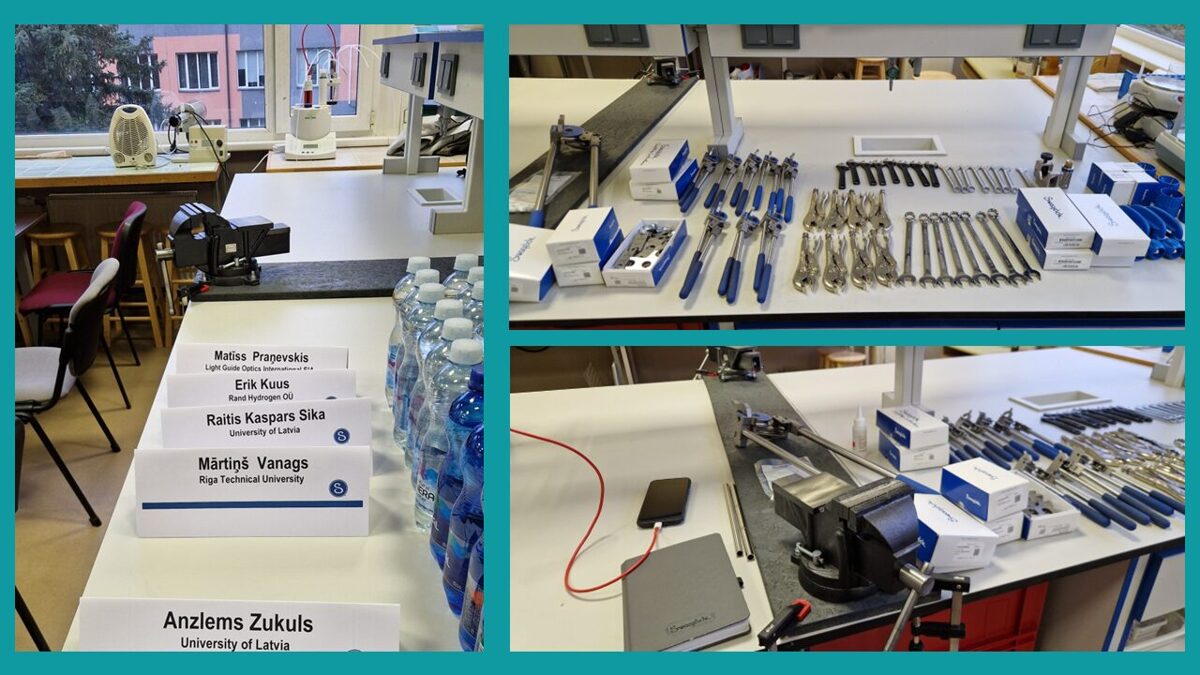 Photos - Matīss Vaivods
Photos - Matīss Vaivods
On October 27–28, representatives from the LACISE project participated in a two-day intensive training focused on designing and installing hydrogen tubing systems. The training took place at Riga Technical University (RTU) and brought together experts and researchers working on hydrogen technologies.
The LACISE team was represented by Anzelms Zukuls and Raitis Sika from the Institute of Solid State Physics, University of Latvia, along with Mārtiņš Vanags from RTU. The training was led by specialists from Swagelok Helsinki – Technical Development Director Sami Juntunen and Sales Representative / Field Engineer Matīss Vaivods – who shared their expertise in hydrogen system safety and engineering.
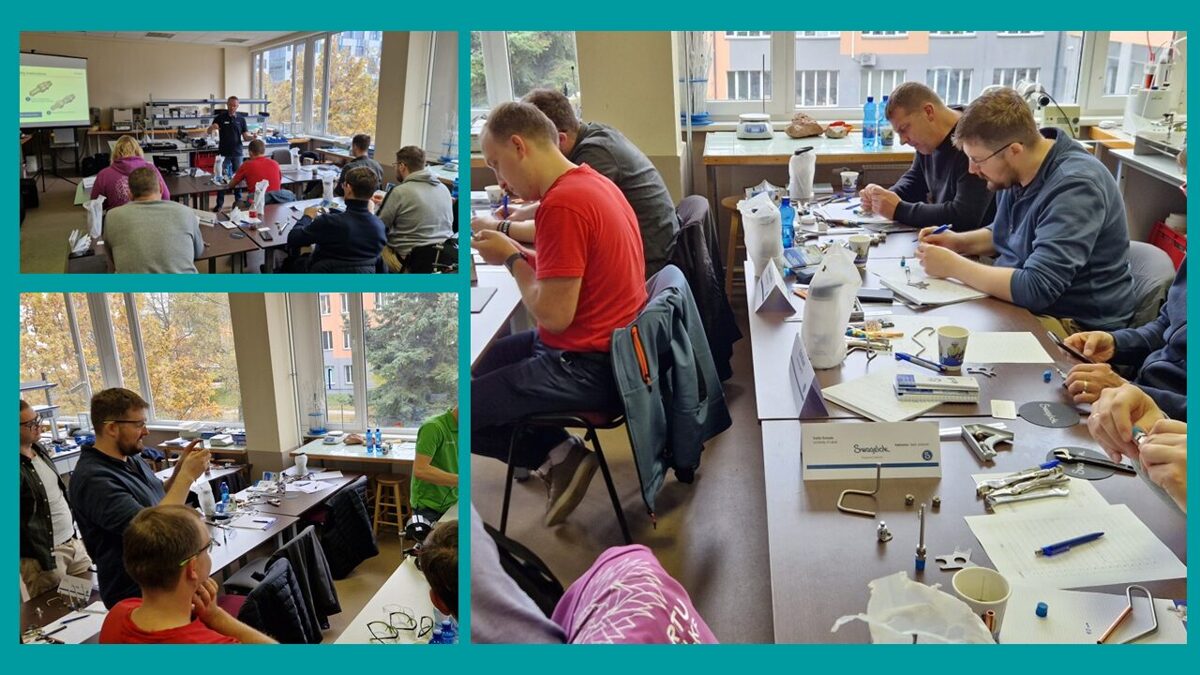 Photos - Matīss Vaivods
Photos - Matīss Vaivods
The aim of the training was to equip participants with both theoretical knowledge and practical skills for the safe and efficient construction of hydrogen gas systems. Topics covered included the correct use of Swagelok connection systems in hydrogen infrastructure, tube bending techniques, material selection, and identification of common installation errors. Participants also had the opportunity to engage in hands-on tube assembly and connection work, gaining valuable experience in building hydrogen-resistant systems.
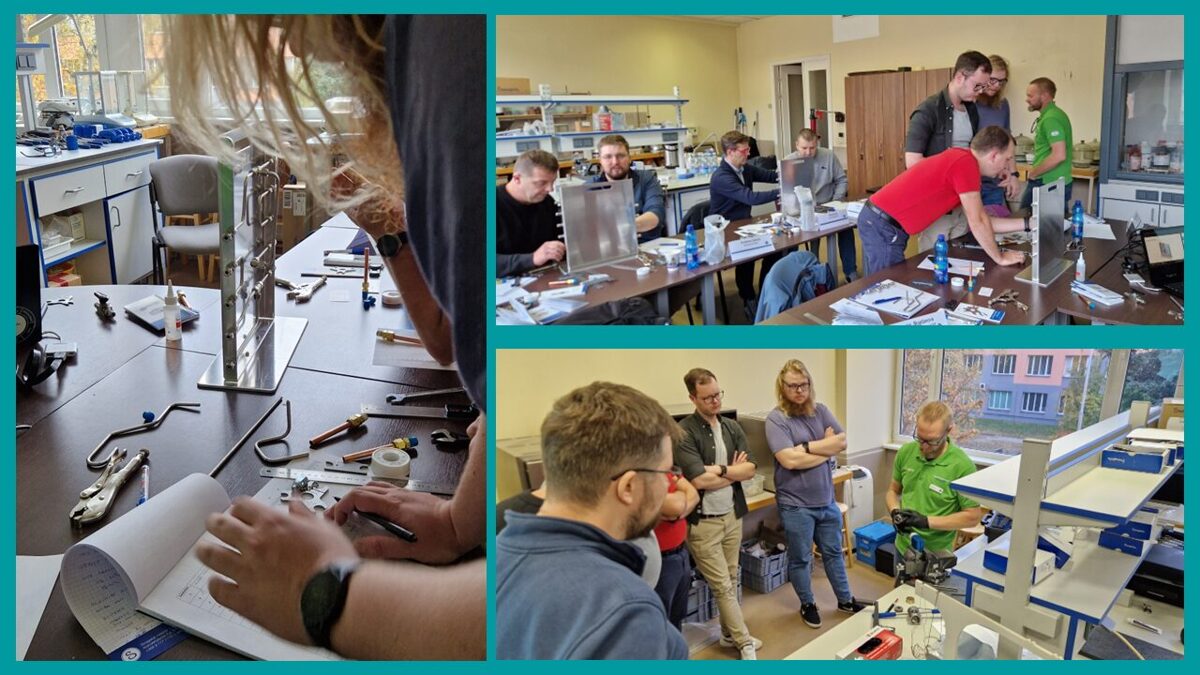 Photos - Matīss Vaivods
Photos - Matīss Vaivods
A highlight of the training was the demonstration of damage detection using hydrogen sensors, offering insights into diagnosing and resolving faults in gas system components.
This practical experience is a significant step forward for the LACISE project, supporting its continued development in the field of hydrogen technologies and reinforcing its commitment to safety and innovation.
LACISE Team Partners with Eco Baltia vide to Access Aluminum Waste for Research
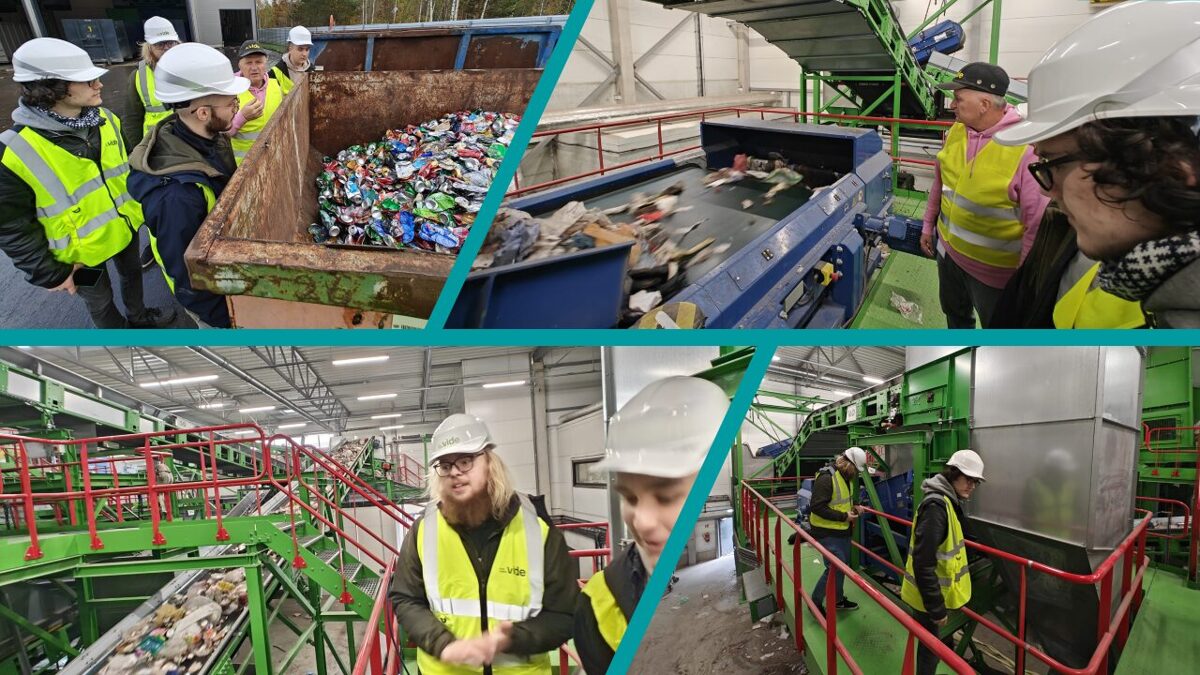 ISSP UL team visits Eco Baltia vide. Photo - Anzelms Zukuls
ISSP UL team visits Eco Baltia vide. Photo - Anzelms Zukuls
On October 14, 2025, LACISE project representatives Anzelms Zukuls, Ņikita Griščenko, Daniels Jurjevs, Raitis Sika, and Rendijs Ronis visited Eco Baltia vide’s Resource Management Center in Riga. They were welcomed by Kristaps Dreimanis, Head of the Sales Department, and Vents Kārkliņš, Production Manager. The visit aimed to learn about sorting processes for household waste containing aluminum, understand its composition, and explore potential recycling pathways. The LACISE team received an in-depth tour of the waste sorting line and discussed the technical aspects of material selection and preparation for research purposes.
A key outcome of the visit was the formalization of a collaboration between the LACISE project and SIA Eco Baltia vide. This partnership will grant the project access to sorted, aluminum-containing household waste, materials that are particularly valuable for experiments and analyses requiring representative aluminum-rich fractions. This milestone marks a significant step toward practical industry collaboration, enabling access to real-world materials and supporting sustainable research endeavors.
 SIA Eco Baltia vide waste aluminum. Photo - Anzelms Zukuls
SIA Eco Baltia vide waste aluminum. Photo - Anzelms Zukuls
Moving forward, the teams will define the scope, material sampling protocols, and data-sharing arrangements to maximize the value of the partnership for LACISE’s research objectives. Bridging research with industry through such collaborations enhances our ability to study aluminum sorting and recycling in real waste streams, driving progress toward more sustainable waste management solutions.
ISSP UL team visits Paul Scherrer Institute in Switzerland
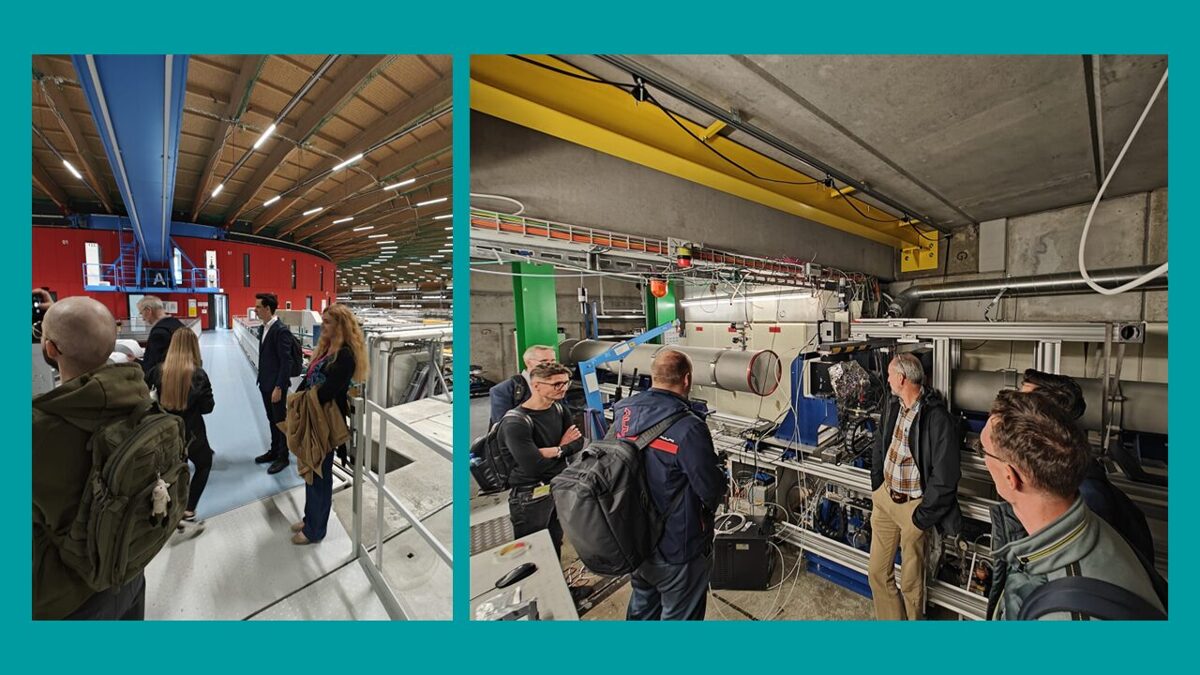
From September 21 to 24, representatives of the LACISE project from the Institute of Solid State Physics, University of Latvia (ISSP UL) – Dr. Gints Kučinskis, Dr. Anzelms Zukuls, and PhD students Ņikita Griščenko and Ināra Ņesterova – visited the Paul Scherrer Institute (PSI) in Switzerland. The purpose of the visit was to strengthen collaboration with project partners, align future research directions, and explore the institute’s infrastructure and research capabilities.
During the visit, discussions were held with LACISE project collaborators regarding the progress of ongoing research, coordination of upcoming experiments, and opportunities to utilize PSI’s equipment and operando measurement cells.
Meetings also took place with Dr. Sigita Trabesinger to discuss battery research, and with Dr. Emiliana Fabbri and Dr. Javier Quilez Bermejo to address specific work package tasks and future collaboration plans. Potential student exchange mechanisms were explored, and a follow-up visit to PSI with a longer stay was planned.

The visit included tours of laboratories and research facilities, as well as participation in the “Operando Day” seminar, where students and researchers presented current studies and discussed methodological and measurement adaptations.
This mission provided a valuable opportunity to reinforce partnerships, expand knowledge on the use of international research infrastructure, and plan the next steps in the LACISE project’s scientific work.
LACISE Project Featured at The Riga Conference 2025
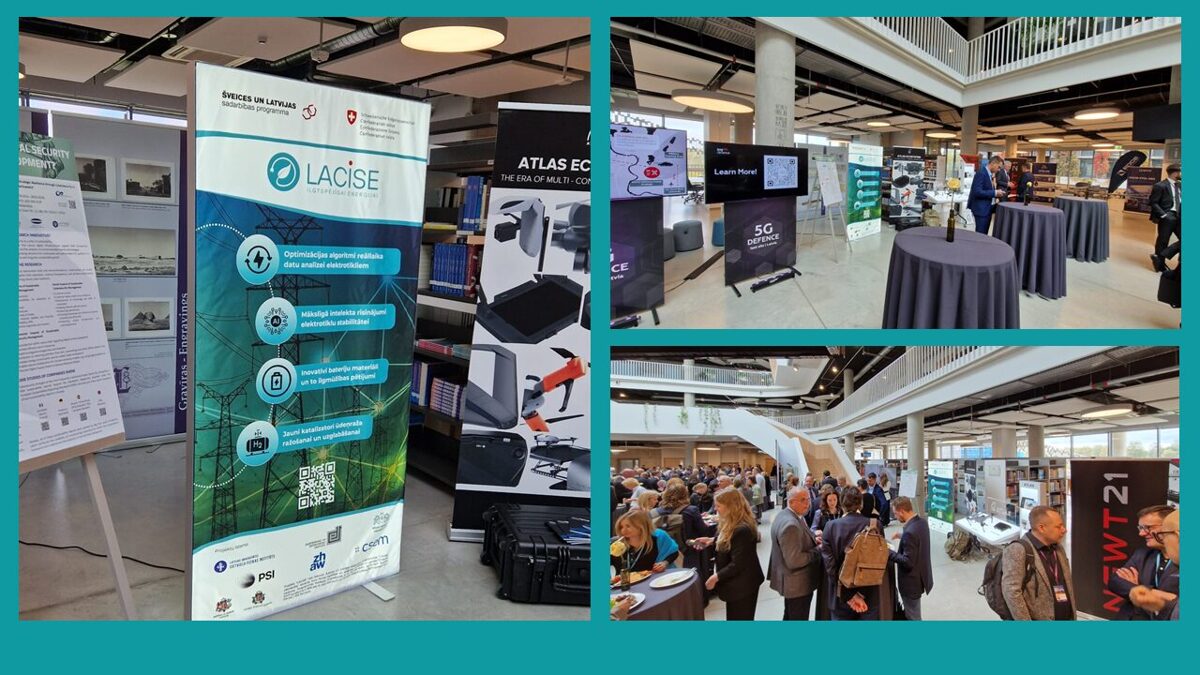 LACISE light box at the Riga Conference 2025. Photo - Gints Kučinskis.
LACISE light box at the Riga Conference 2025. Photo - Gints Kučinskis.
The LACISE project was showcased at The Riga Conference 2025, held from October 9–11 at the House of Science, University of Latvia. As the largest security and foreign policy forum in the Nordic-Baltic region, the conference brought together over 700 participants from approximately 45 countries, including policymakers, defence and security experts, diplomats, academics, journalists, and business leaders.
LACISE was represented in the exhibition area, where a dedicated project light box introduced attendees to this strategically important initiative for Latvia’s energy future. The display highlighted LACISE’s role in strengthening national energy resilience and advancing Latvian expertise in the energy sector. Dr. phys. Gints Kučinskis, the project coordinator, was also present, engaging with participants and emphasizing the project’s relevance in the broader context of European strategic investment and sustainability.
The conference featured high-level speakers such as Latvian Prime Minister Evika Siliņa, President of the European Parliament Roberta Metsola, EU Commissioners Andrius Kubilius and Valdis Dombrovskis, U.S. Permanent Representative to NATO Matthew J. Whitaker, and former NATO Military Committee Chair Admiral Rob Bauer, alongside experts from Europe, Asia, and the Americas.
Discussions focused on key themes including NATO’s future, Ukraine’s long-term security, strategic investment in European defence, Baltic Sea regional security, hybrid warfare, geoeconomics, and business resilience.
The event was organized by the Latvian Transatlantic Organisation (LATO) in cooperation with the Ministry of Foreign Affairs, the Ministry of Defence, the University of Latvia, the European Commission Representation in Latvia, and the Konrad Adenauer Foundation. It was supported by the embassies of Sweden, France, Spain, Germany, the Netherlands, Turkey, Israel, and Canada.
LACISE’s presence at this prestigious event underscores its growing visibility and importance in shaping Latvia’s energy landscape and contributing to regional resilience.
More about the event on the Riga Conference 2025 website.
Progress of the Swiss-Latvian Cooperation Programme “Partnership in Applied Research” is assessed at first Steering Committee meeting

On October 3, 2025, the first meeting of the Steering Committee of the Swiss-Latvian cooperation programme “Partnership in Applied Research” took place at the Ministry of Education and Science. During the meeting, the progress of the program was evaluated and decisions on further steps were made. The meeting was attended by representatives from the Ministry of Education and Science, the Embassy of the Swiss Confederation, the Ministry of Finance, the Latvian Council of Science, Riga Technical University, the Institute of Solid State Physics, University of Latvia, and EMPA (Swiss partner).
The main objective of the programme is to strengthen Latvia’s scientific and innovation capacity by strengthening cooperation with Swiss research institutions and promoting sustainable growth. Two significant projects are being implemented under the programme: LACHMAT is developing new solutions for road surfaces, concrete technologies, and 3D-printed concrete using local minerals. LACISE, on the other hand, focuses on smart energy grids, new battery materials and hydrogen technologies from aluminium waste.
Both projects have already achieved their first results, involving doctoral, master’s and bachelor’s students. Cooperation with industry has been initiated to ensure the practical application of research results, and the first innovative solutions for sustainable infrastructure and energy are being
The Steering Committee also \ reviewed the programme’s communication plan. It aims to raise public awareness of Switzerland’s contribution, strengthen young people’s interest in STEM fields, and ensure the visibility of results in Latvia and beyond.
Future plans include developing new solutions in collaboration with industry, establishing a digital competence centre for energy storage and smart grids, and strengthening the involvement of young people and schoolchildren in science.
The Swiss-Latvian cooperation programme “Partnership in Applied Research” confirms that international cooperation makes a significant contribution to both science and society.
The total budget of the programme until 2029 is EUR 12,352,941, of which Switzerland’s co-financing is 85% or EUR 10,500,000, while the Latvian state budget co-financing is 15% or €1,852,941. The programme is implemented by the Ministry of Education and Science in cooperation with the Latvian Council of Science.
When Science Becomes an Adventure – LACISE Debuts at European Researchers’ Night
 LACISE at the Researchers' Night - Hydrogen bubbles, hydrogen vehicle model, demonstration - How hydrogen is produced. Photo: Valdis Jansons
LACISE at the Researchers' Night - Hydrogen bubbles, hydrogen vehicle model, demonstration - How hydrogen is produced. Photo: Valdis Jansons
On the evening of September 26, the 20th European Researchers’ Night took place under the inspiring slogan “Discover the Researcher Gene Within You.” This year marked the debut of the LACISE project at the event, offering a wide range of engaging activities in the 3rd-floor lobby of the Institute of Solid State Physics, University of Latvia (ISSP UL).
The ISSP UL’s Energy Materials Laboratory, which is directly involved in the project's scientific work, ensured that Researchers’ Night became a memorable evening for both young and old. Highlights included exploding hydrogen bubbles, models of hydrogen- and solar-powered cars, a live demonstration of hydrogen production, and a challenging quiz game. Guests had the opportunity to interact with researchers, watch the car models in action, and even experience the thrill of popping hydrogen bubbles.
 Solar-powered and hydrogen-powered vehicle models, participants of the LACISE quiz. Photo: LACISE project
Solar-powered and hydrogen-powered vehicle models, participants of the LACISE quiz. Photo: LACISE project
Visitors also tested their knowledge in a quiz game created by LACISE scientists. Hosted on the Kahoot! platform, the game featured four themed quizzes: batteries, hydrogen, energy, and the LACISE project. Participants could choose a topic and tackle 10 tricky questions, with LACISE souvenirs awarded to winners. Throughout the evening, 35 quiz sessions were held, attracting 146 participants.
 LACISE quiz participants. Photo: LACISE project.
LACISE quiz participants. Photo: LACISE project.
This year, ISSP UL welcomed a record-breaking crowd of over one thousand science enthusiasts. Many were upper-grade students, but the event also drew strong interest from families with preschool and primary school-aged children, all eager to spend their Friday evening discovering something new.
The LACISE project extends its heartfelt thanks to all visitors for their enthusiasm and curiosity.
European Researchers’ Night was first held in 2005. The event was designed to foster public understanding of science and research, demonstrating that science is exciting, accessible, and relevant to everyday life. Each year, Researchers’ Night invites the public to visit research and educational institutions to see how science is made, meet researchers, ask questions, and participate in various activities. At the same time, the event aims to inspire young people to pursue careers in science, especially by engaging students and encouraging interest in STEM fields.
Bridging Baltic and Swiss energy research: IECS’ visit to ZHAW
 Photo: IECS team visits ZHAW colleagues.
Photo: IECS team visits ZHAW colleagues.
As part of the LACISE project, the IECS team conducted an exchange visit to its Swiss partners in Winterthur, hosted by the Zurich University of Applied Sciences (ZHAW). From September 3 to 6, this experience exchange aimed to deepen IECS collaboration with ZHAW researchers, to become acquainted with the university’s energy research strengths, and participate in a hands-on seminar on the PowerFactory modeling tool.
The visit began with a warm welcome at ZHAW’s Institute of Energy Systems and Fluid Engineering, where the IECS team—Anna Mutule, Antons Hančevskis, Aleksejs Onackis, Roberts Lazdiņš, and Laura Birzenberga—engaged in a comprehensive overview of ZHAW’s ongoing research. Key areas of focus included in-depth frequency measurement data analysis, energy system modeling with experimental equipment, strategies for optimizing inverter efficiency, and the practical applications of the OPAL-RT real-time simulator.
The central objective of the trip was advancing the dynamic modeling of the Baltic energy system, a core activity within Work Package 2 (WP2) of the LACISE project. Participants discussed the challenges facing Baltic and broader European energy systems, notably the rapid growth of inverter-based generation across all voltage levels. This trend is reshaping the generation mix, impacting frequency stability, and underscoring the need for dynamic security assessment tools to help system operators navigate a changing landscape of generation and consumption.
During the visit, the IECS team took part in a hands-on PowerFactory workshop led by Dr. Miguel Ramirez Gonzalez and Dr. Artjoms Obusevs.

Joint discussions with ZHAW colleagues culminated in a concrete plan for collaboration, including:
- Data acquisition and export workflows within the PowerFactory environment.
- Application of modeling approaches to the Baltic energy system, with an eye toward scaling and transferability.
- Utilization of the developed models to support ongoing scientific cooperation and strengthen international projects.
The visit underscored the value of cross-border collaboration in tackling contemporary energy challenges.
IECS team extends their thanks to all colleagues at ZHAW for their hospitality and insights, and looks forward to forthcoming joint activities that will drive innovation in energy systems modeling and resilience.
LACISE IECS delegation visits CSEM to strengthen innovation ties
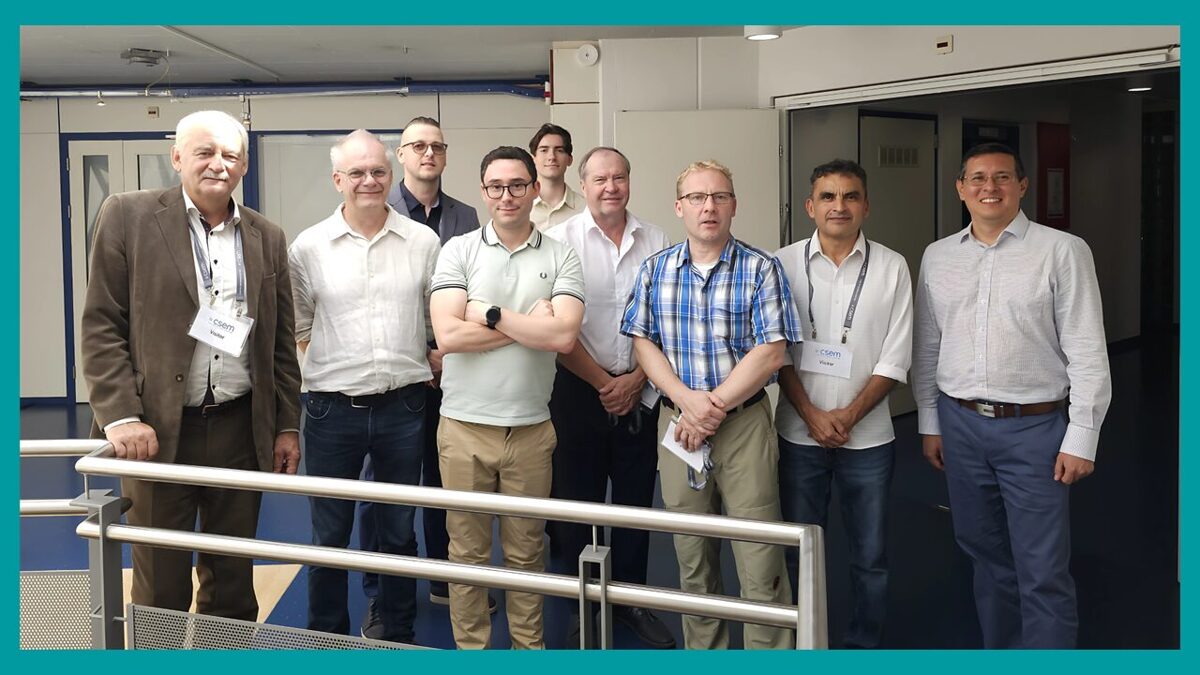 LACISE experience exchange visit at CSEM
LACISE experience exchange visit at CSEM
From August 27–28, the picturesque city of Neuchâtel hosted two days of collaboration, innovation, and forward-looking dialogue as Swiss partners from the Centre Suisse d’Électronique et de Microtechnique (CSEM) welcomed their Latvian counterparts from the Latvian Institute of Electronics and Computer Science (IECS). The aim of the visit was to review the results achieved so far and define the next steps in the research directions of IECS and CSEM in the field of solar radiation forecasting, thereby contributing to the development of more accurate forecasts and models.
Hosted at CSEM’s headquarters, the meeting brought together experts, researchers, and policymakers to explore new opportunities in technology development, renewable energy, and applied research. Participants included representatives from IECS, ZHAW, SECO, and CSEM, each contributing unique perspectives and expertise.
The event opened with a warm welcome from CSEM, followed by progress presentations from IECS researchers Kaspars Sudars, Ivars Namatēvs, and Normunds Andžāns. The IECS researcher presented a new solar radiation measurement station equipped with a sky camera, radiation sensor, and anemometer for synchronized data collection to improve short-term forecasting of photovoltaic output. They also demonstrated their U-Net algorithm for predicting cloud movements and solar irradiance, highlighting the importance of AI-based methods for renewable integration.
Further discussions explored the experiences of CSEM and IECS as research institutions collaborating with industry, as well as topics such as intellectual property management and technology transfer opportunities in Switzerland and Latvia, including how these issues could be addressed within the context of the LACISE project. Participants in this conversation included: Modris Greitāns (IECS Director), Bahaa Roustom (Head of Business Development at CSEM), Philippe Dallemagne (CSEM), Petr Korba (ZHAW), and Nicolas Guigas of the Swiss State Secretariat for Economic Affairs (SECO).
A highlight of the morning was the lab tour, where participants explored CSEM’s clean room facilities and cutting-edge 3D printing capabilities. The afternoon shifted to technical deep-dives on grid data modeling, irradiance sensors, and in-situ deployment, culminating in a visit to CSEM’s battery hub.
The second day focused on the future of the LACISE project, with sessions dedicated to next steps, timelines, and a publication plan. Open discussions encouraged cross-border collaboration, ensuring that the momentum generated during the visit will translate into tangible outcomes.
The gathering underscored the shared commitment of Latvian and Swiss institutions to push the boundaries of applied science and technology. By combining expertise in electronics, microtechnology, and renewable energy, the partnership aims to deliver impactful solutions for both nations and beyond.Article about the LACISE project in the Latvian Academy of Sciences' “Science Bulletin”

The Latvian Academy of Sciences’ “Science Bulletin” (Zinātnes Vēstnesis) (No. 7 (656), July 28, 2025), published an article about the LACISE project implemented within the Swiss–Latvian cooperation program “Applied Research.” The project focuses on researching and developing solutions for both short-term implementation and long-term advancement in key energy sectors, contributing to the stability of the energy supply system, the creation of next-generation batteries, and the enhancement of hydrogen production technologies.
The project aims to address the challenges of modern energy while educating the next generation of scientists. The article notes the project’s commitment to increasing interest in STEM among young people, especially girls. It describes how students participate in research while school students engage in activities that foster scientific curiosity.
The article mentions that the Stakeholder Advisory Board has been founded, in which Latvian and Swiss companies and public organizations participate, to ensure the practical application of research results. The Swiss–Latvian Competence Center has also been established within the framework of LACISE, with activities aimed at promoting cooperation, innovation, and knowledge exchange between scientists from both countries.
The significance of the project is underscored by total funding of €7.144 million, which enables technology development by attracting leading scientists, enhancing youth involvement, and driving practical innovations.
Following an introduction to the LACISE project, readers of the “Science Bulletin” article learn about the Swiss–Latvian cooperation program, particularly its Applied Research sub-programme—its origins and evolution—and the potential of such scientific collaboration between the two countries to address global challenges.
The “Science Bulletin” (Zinātnes Vēstnesis) is a joint publication of the Latvian Council of Science, the Latvian Academy of Sciences, and the Association of Latvian Scientists. It covers current events and major advances in Latvia’s science. Published since 1989, it now appears monthly online in Latvian.
Full article in Latvian (pages 6 and 7)Exploring the ISSP UL laboratories: strengthening collaboration and experience among LACISE partners
 LACISE lab tour at the ISSP UL. Photo - Valdis Jansons.
LACISE lab tour at the ISSP UL. Photo - Valdis Jansons.
Following the official project kickoff on May 6, the LACISE consortium partners—including representatives from the Institute of Electronics and Computer Science, Riga Technical University, Paul Scherrer Institute, Zurich University of Applied Sciences, and the Swiss Center for Electronics and Microtechnology—visited the laboratories of the Institute of Solid State Physics, University of Latvia (ISSP UL).
The event began with a brief overview of the institute’s activities, highlighted through key figures and significant milestones, presented by the LACISE coordinator during the official opening. However, the main focus of the visit was to provide participants with a firsthand experience of the state-of-the-art facilities and equipment available at ISSP UL, as well as the talented researchers—both young and seasoned—who operate within these laboratories.
The tour commenced at the Thin Film Laboratory, where attendees learned about ongoing research projects and current initiatives. Next, participants visited the Energy Materials Laboratory, the core research hub for activities related to the LACISE project. The laboratory’s lead researcher, Ainārs Knoks, introduced the team’s hydrogen research, sharing insights into the innovative hydrogen production technologies under development. Guests were also given the opportunity to observe the specialized equipment used by the scientists on a daily basis.
 LACISE partners at the ISSP UL labs. Photo - Valdis Jansons.
LACISE partners at the ISSP UL labs. Photo - Valdis Jansons.
Subsequently, the visitors explored other sections of the Energy Materials Laboratory, which primarily focuses on research into batteries and supercapacitors. Gints Kučinskis, head of the laboratory and coordinator of the LACISE project, discussed the laboratory’s research directions and ongoing projects. The session concluded with an engaging Q&A session, allowing guests to interact directly with the research team.
The tour’s final stop was the largest of the ISSP UL labs—the Spectroscopy Laboratory. Its head, Anatolijs Šarakovskis, provided a detailed overview of the laboratory’s advanced instrumentation and the types of research enabled by each piece of equipment. He outlined the laboratory’s main research areas and responded to questions from the participants.
 Informal discussion after lab tour. Photo - Valdis Jansons.
Informal discussion after lab tour. Photo - Valdis Jansons.
Following the laboratory visits, attendees gathered for a final discussion session. This informal segment allowed partners to reflect on what they had seen and learned, thereby fostering a better mutual understanding. It also served as an opportunity to strengthen personal connections, which are vital for effective collaboration throughout the project. Building trust and camaraderie among partners is essential for smooth communication and the successful implementation of the project.
Project kickoff event features first LACISE Stakeholder Advisory Board meeting

The LACISE project officially commenced with an inspiring kickoff event at the Institute of Solid State Physics, University of Latvia, on May 6. A key feature was the lively panel discussion, which involved members of the Stakeholder Advisory Board (SAB) who shared their insights, expectations, and strategic perspectives on the project’s path forward.
Stakeholder contributions and key messages
Līna Sarma, Riga Tech Girls: Highlighted the importance of talent development, emphasizing that passion drives progress and attracts skilled individuals. She emphasized the importance of effective communication strategies to effectively convey the project’s message and attract the right partners and students.
Pēteris Lesničenoks, Latvenergo: Focused on aligning research with real-world applications. He emphasized the importance of supporting educational programs and the need for clear, practical outcomes that benefit the energy grid.
Aleksandrs Parfinovičs, NACO: Advocated for early involvement of industry experts in project planning to provide scalable advice. He pointed out the lack of standardized methods for evaluating hydrogen technologies, calling for the development of such standards to facilitate broader industry adoption.
Mārtiņš Grels, RIX: Stressed the importance of attracting and nurturing young talent, noting that some industry professionals may hesitate or lack confidence. He encouraged proactive engagement and more frequent updates on hydrogen-related progress, including annual reviews. He also called for feedback on the usability of new technologies and their validation in real-world settings.
Kaspars Liepiņš, Hydrogen Alliance: Focused on the potential of batteries and hydrogen technologies, advocating for meaningful and innovative solutions while minimizing bureaucracy. He expressed interest in EU venture capital and startup opportunities, emphasizing the need to select projects with real market potential.
Minglon He, ABB (remote): Emphasized the importance of predictive models and algorithms, especially for frequency regulation as renewable energy sources increase. He highlighted the role of batteries, hydropower, and gas in maintaining grid stability. He also stressed that industry R&D is largely internal, but collaborative knowledge sharing is essential for innovation. He encouraged engaging students in industry-relevant topics and called for regular technical exchanges and updates to ensure alignment and tangible outcomes, such as grid integration and hydrogen applications.
Kristaps Dambis, Drive eO: Advocated for a global perspective, noting that world-class research must be locally relevant. He emphasized the importance of direct communication and collaboration with scientists, as well as the involvement of young talent in the broader energy transition.
Common themes and future outlook
The panel underscored several recurring themes critical to the project’s success:
- The necessity of talent development and inspiring the next generation of innovators.
- The importance of collaboration across sectors and open communication channels.
- Bridging research and commercialization to bring market-ready solutions.
- Developing standardized evaluation frameworks, particularly for hydrogen technologies.
- Ensuring scientist involvement as consultants to guide practical development and validate results.
The panel emphasized the importance of continuous dialogue, regular technical exchanges, and stakeholder engagement to ensure the LACISE project remains aligned with industry needs and scientific advancements. The diverse expertise and shared commitment of the advisory board set a strong foundation for the project’s impactful journey toward sustainable energy solutions.
